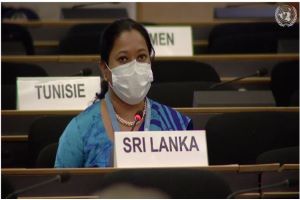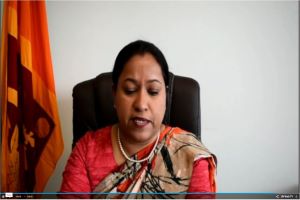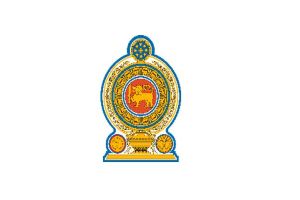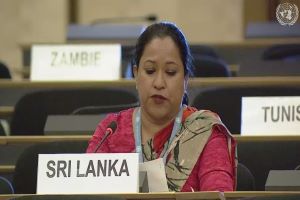
Statement by the Democratic Socialist Republic of Sri Lanka
44th Session of the Human Rights Council
Agenda Item 3: Interactive Dialogue with Special Rapporteur on the human rights of migrants
06 July 2020
Madam President,
Sri Lanka welcomes the report presented by the Special Rapporteur on the human rights of migrants.
The contribution of migrant workers to economic growth and development is increasingly becoming critical not only for their own countries, but also as a catalyst for the upward socio-economic mobility in the region and internationally.
We believe that the COVID-19 crisis taught the world that coordinated and concerted efforts are needed to ensure that migrant health is addressed without discrimination throughout the migration cycle. A further consequence of Covid-19 has been the shrinking of the employment market, which could lead to a serious shortfall in the numbers of migrant workers who will leave for work this year and in turn a drop in worker remittances.
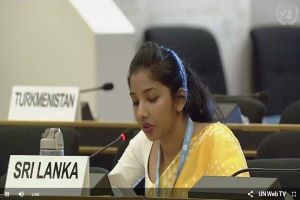
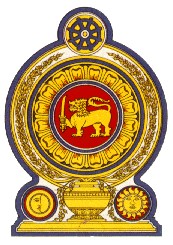
Statement by the Democratic Socialist Republic of Sri Lanka
44th Session of the Human Rights Council
Agenda Item 3: Interactive dialogue with Special Rapporteur on the Right of Everyone to the Enjoyment of the Highest Attainable Standard of Physical and Mental Health
06 July 2020
Madam President,
Sri Lanka welcomes the report presented by the Special Rapporteur on the right of everyone to the enjoyment of the highest attainable standard of physical and mental health. We believe this is timely given that the COVID-19 pandemic is affecting both the physical and mental health of the peoples around the world in an unprecedented manner.
According to WHO statistics, the leading cause of death among young people aged 15-29 has been identified as suicide and most causes are both preventable and treatable. It is distressing that every 40 seconds, someone is dying of suicide somewhere in the world.
It is important to ask what kind of concerns mental health issues cause for humanity and what must be done to address this challenge as we pursue a policy of 'leaving no one behind' in advancing the UN development agenda- 2030, and specially SDG 3 - Good Health and Well-being.

44th Session of the Human Rights Council
Agenda Item 2: Interactive dialogue on the annual report of the High Commissioner
02 July 2020
Statement by Sri Lanka
Madam President,
Sri Lanka welcomes the presentation by the High Commissioner for Human Rights, the Annual Report of her Office for 2019.We appreciate the initiatives taken by the Office to provide technical and financial assistance to States upon request, and highlight the need for equitable geographical representation in the Office. In continuation of our commitment to constructive engagement, Sri Lanka will be making a voluntary contribution of USD 5000 to the Office of the High Commissioner in 2020.
Sri Lanka also notes the oral update provided to this Council by the High Commissioner for Human Rights on Tuesday, on COVID-19 related human rights implications in the world. We welcome the High Commissioner’s request for greater international solidarity in recovering from the pandemic, especially her call to recognize a future COVID-19 vaccine as ‘a global public good’, and the call for easing or suspension of sanctions that hinder pandemic-related relief.
As a country that has guaranteed free universal healthcare to all its people since 1953, through one of the highest per capita health expenditures in its region, Sri Lanka has been able to successfully contain the spread of COVID-19 through a balanced, multi-sectoral approach.
43rd Session of the Human Rights Council
Agenda Item 1 - Urgent Debate on the “current racially inspired human rights violations, systemic racism, police brutality and the violence against peaceful protest”
Statement by the Democratic Socialist Republic of Sri Lanka
17 June 2020
Madam President,
Sri Lanka considers this Urgent Debate on “racially inspired human rights violations, systemic racism and police brutality against people of African descent, and violence against peaceful protest” an important and timely decision by the Human Rights Council (HRC) during its on-going 43rd session. We thank the African Group for proposing this initiative and the members of the Council for endorsing it.
Statement by the Democratic Socialist Republic of Sri Lanka
43rd Session of the Human Rights Council
Item 7: General Debate
15 June 2020
Madam President,
Sri Lanka takes this opportunity to re-iterate its consistent and principled position that the people of Palestine have a legitimate and inalienable right to statehood and to the natural resources in their territory.
In this respect, we take note of the reports presented by the High Commissioner for Human Rights regarding the human rights situation in Palestine and other occupied Arab territories under Agenda Item 7 and express deep concern on, among other matters, the issue pertaining to settlement expansion, particularly the recent decision by the Government of Israel to proceed with the annexation of significant parts of the occupied West Bank. l. We echo the alarm expressed by the Special Rapporteur on the situation of human rights in the Palestinian Territory occupied since 1967 and the UN Special Coordinator for the Middle East Peace Process in this connection, and join international calls to urge the Government of Israel to halt any annexation activities, which would have far reaching and devastating repercussions. As stated in the Communique of the NAM Coordinating Bureau, of 15 May 2020, we note that this would constitute a grave breach of international law, including the UN Charter, relevant conventions as well as Security Council and General Assembly resolutions.
Sri Lanka’s Acting Permanent Representative to the United Nations in Geneva, Dayani Mendis, in a letter addressed to the United Nations High Commissioner for Human Rights, Michelle Bachelet, has raised concerns regarding the allegations made in a press release issued by the High Commissioner on 03 June 2020 regarding “clampdown” of freedom of expression during COVID-19, in which a reference had been made to Sri Lanka.
The letter highlights that it has become essential for all countries and Governments to take measures to counter misinformation and disinformation in the interest of protecting public health, particularly during the COVID-19 pandemic. These measures are also in line with the consensus resolution on COVID-19 response adopted on 18 May 2020 at the 73 World Health Assembly (WHA), which also, inter alia, calls on Member States to provide the population with reliable and comprehensive information on COVID-19 and take measures to counter misinformation and disinformation.
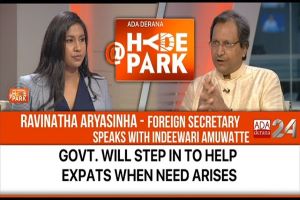
Foreign Secretary Ravinatha Aryasinha has outlined the role and preparations of the Ministry of Foreign Relations and its missions across the world, in helping Sri Lanka tackle the COVID-19 pandemic and addressing concerns of Sri Lankan nationals overseas. Referring to Sri Lankan citizens abroad, he said “parents here in Sri Lanka, should rest a little bit more comfortably about their children, knowing that the Embassy is a phone call away and if there are issues on the ground, that our Missions abroad will deal with it” and that “if there is a real calamity, the Government of Sri Lanka will step in”. He said while dealing with the immediate concerns at hand, the Ministry and Missions are working hard “to anticipate and prepare for any difficulties ahead, and to further map out what we do the day after this problem is solved, particularly on the economic front”.
The Foreign Secretary made these observations, in a wide-ranging interview with Indeewari Amuwatte, on the ‘Hyde Park’ programme of Ada Derana 24, on 4 April 2020.
Full interview is at : https://www.youtube.com/watch?v=zY1eD5c__h4
- Statement of Sri Lanka at Interactive Dialogue of the 43rd Session of Human Rights Council with the Special Rapporteur on freedom of religion or belief
- Foreign Relations Minister meets UN High Commissioner for Human Rights
- Statement made by Hon. Dinesh Gunawardena, Minister of Foreign Relations at the 43rd Session of the Human Rights Council

